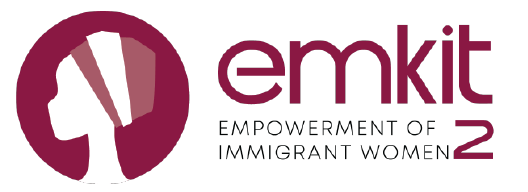This output is a complete Qualifications Framework for the Cultural Awareness and Expression according to the EQF respecting the general guidelines as set in the ERF. The QF will present the Work Areas (Dimensions) expressed into Learning outcomes for Knowledge, Skills and Competencies
The QF for the Cultural Awareness and Expression Competence has 2 innovations as outlined in the previous output:
- The development of the Learning Outcomes takes into account the context in which the Qualifications Framework is developed, (i.e. target group is migrant women and purpose is accessing the labor market). Therefore the Learning Outcomes will be specific and focused to the needs of the target group.
- It is important to identify which Learning Outcomes should be achieved at each stage. Therefore the QF will present the LOs per stage (stage 1-6 according to the active citizenship ladder). LOs at each stage will be cumulative. Once the LOs are achieved (via the implementation of activities and workshops defined at that stage) the woman can progress to the next stage.
This output is a complete Qualifications Framework for the Cultural Awareness and Expression according to the EQF respecting the general guidelines as set in the ERF. The QF will present the Work Areas (Dimensions) expressed into Learning outcomes for Knowledge, Skills and Competencies
The QF for the Cultural Awareness and Expression Competence has 2 innovations as outlined in the previous output:
- The development of the Learning Outcomes takes into account the context in which the Qualifications Framework is developed, (i.e. target group is migrant women and purpose is accessing the labor market). Therefore the Learning Outcomes will be specific and focused to the needs of the target group.
- It is important to identify which Learning Outcomes should be achieved at each stage. Therefore the QF will present the LOs per stage (stage 1-6 according to the active citizenship ladder). LOs at each stage will be cumulative. Once the LOs are achieved (via the implementation of activities and workshops defined at that stage) the woman can progress to the next stage.
This output is a complete Qualifications Framework for the Media Literacy according to the EQF. The QF will present the Work Areas (Dimensions) expressed into Learning outcomes for Knowledge, Skills and Competence . As indicated in previous outputs the QF will present the LOs per stage (stage 1-6 according to the active citizenship ladder).
This competence is multidimensional as it addresses:
- Digital Competences
- Critical Thinking Competences
- Communicative abilities (content creation)
- Social Competences (social participation)
This output refers to the design and development of 42 experiential and innovative workshops for the development of the Learning Outcomes identified in the 3 Qualification Frameworks developed (O1, O2, O3). Each workshop will address one or more Learning Outcomes identified in the 3 QFs.
More specifically, for the development of the Social & Civic Competence, Cultural Awareness and Expression Competence and Media Literacy competence the consortium will design:
- experiential workshops – Experiential workshops have been around for many years for the development of “soft skills” such as team building but the experiential approach for teaching these competences is new.
- Other innovative workshops – by innovative we refer to innovative ways of delivery such as spaced learning, engagement, observing, reflecting etc.
This output is a digital assessment tool that will be available on-line (on the EMKIT2 online toolikt).
In EMKIT2 the assessment tool will evaluate the stage a woman is according to the active citizenship ladder.
A questionnaire which addresses the outcomes of each of the 6 stages will be developed and it will cover several common dimensions related to all 6 stages like: motivation level, career awareness, social network, social and civic competence, cultural awareness, media literacy, self-management level. Based on the answers provided an algorithm will calculate the stage a woman is.
The assessment tool will be in a digital form and accessible via the EMKIT2 web site.
This output refers to the conversion of the 42 methodology guides for the workshops into 42 unique digital tools. Here we should stress the UNIQUENESS of each tool meaning that each tool is uniquely designed based on the content of the methodology guide.
Although the guides have common format (i.e. an overview of the workshop, In depth description of the workshop, Challenges it addresses, Expected Outcomes, Step by Step instructions etc.) each tool is an individual “mini” web site with pictures relevant to the workshop and clickable elements.
